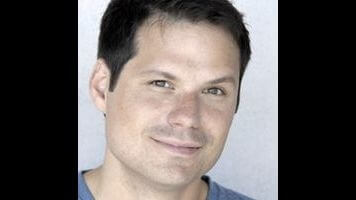My mother has no belly button. They took it during one of her “major” surgeries … If a doctor ever asks me how attached I am to my own belly button, I will answer, “Very!” because although I am not crazy about any of my body parts, I am selfish enough that I would like to keep them all … Having it taken seems like a peculiar kind of bodily transgression, as if a burglar broke into your house but only stole your high school ring.
This is the kind of tone he takes as he considers his mother’s serious decline into terminal illness as well as his own less-serious decline into middle age. He mourns his thinning hair, his expanding waistline, and the terrible state of his feet (fungus-y toenails, strips of dead skin peeled off like “people jerky” and flicked to the floor “like foot boogers”). His feet are so bad he confesses that “while shooting a love scene in a movie called Wet Hot American Summer … I suggested that my sex scene with People magazine’s future Sexiest Man Alive Bradley Cooper be shot with the two of us wearing tube socks” not so much for comedic effect, but “to avoid anyone seeing my feet.”
Each chapter is an essay devoted to a different aspect of life in middle age, and each is a mix of serious thought and humorous undercutting. When Black takes up running he admits that what he’s really after is a spiritual experience: “I have no church. I have no faith. My mother is falling apart in pieces and my children are growing up and I am getting old and I need some reassurance that everything is going to be okay.” But then he ends his meditation on ultramarathoners and their physical struggles with: “I wonder what they learn out there and I wonder if they are different when they return. And when I am done thinking about them, I take a nap, because fuck that.”
When he considers how he would like to not care what other people think about him he writes, “Yes, we all like to imagine ourselves as iconoclasts, hacking new trails across the tattered landscape of conventional thought. But that’s a lie. For as much as we like to think that we are freethinkers who care not a whit what others think of us, I’ve never met anybody for whom that is true. Maybe the guy who hiked to Alaska in that book, Into The Wild, but he wound up starving to death.” And when he thinks about wanting to leave “some sort of legacy through our works and deeds” he rebels:
It strikes me as such a futile idea—that we should be remembered at all. Remembered by whom? Do we expect unborn generations to sing our praises? If so, why? What’s the best any of us can hope for, anyway—that some future sixth grader will one day write a book report about us? As the parent of a sixth grader, I can assure you they are lazy researchers and terrible writers.
Whether it’s musing on life in suburban Connecticut (“It’s like Lord Of The Flies up here, wardrobe by J. Crew”) or telling the story of the time he challenged Tucker Max to a fistfight (“Oh shit… Guys like me don’t fight. At worst, we litigate”) or resisting the physical changes that come with age (“I don’t consider myself to be a particularly vain man but that is because I am lying”), Black is thoughtful—and funny. But even as he undercuts with humor, the cut isn’t deep enough to destroy what he has built in the passages that come before, in which he wonders honestly and often poignantly about love and loss, family and masculinity, mortality and legacy. If our eyes tear up it’s not always from laughter. Black would say we just need better light or stronger reading glasses. But it’s something else—something sweeter.

